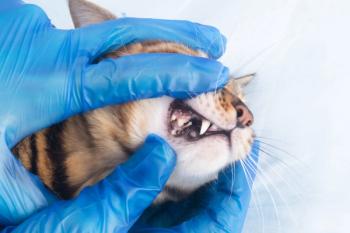
Journal Scan: Can cats develop long-term Toxoplasma gondii immunity after initial infection?
Study notes that highest period of shedding is after first infection, but cats arent totally immune from subsequent infection.
PetarPaunchev - stock.adobe.com
Why they did it
Toxoplasma gondii is a protozoan parasite that can infect all warm-blooded animals, reptiles and birds. However, its only definitive host is cats. As T. gondii is a zoonotic parasite, its behavior and shedding by domestic cats is of significant interest in human medicine. It is particularly important as prevention of T. gondii infection is common advice for pregnant women due to risk of fetal transmission and birth defects. T. gondii has also been implicated in a number of subtler human diseases such as bipolar disorder.
What they did
Thirteen 3-to-6-month-old kittens were infected with one of four strains of T. gondii. Feces were then collected daily for 20 days following infection and analyzed for shedding of oocysts. The process was repeated 12, 24 and 36 months later.
What they found
Shedding of T. gondii was as expected after the first infection. After 12 months, they found protection against shedding after re-infection for 90% of the cats, provided that the second strain was heterologous or homologous to the first strain. However, after 36 months only 33% of the cats were protected against shedding T. gondii after re-infection. Numbers of oocysts shed for each cat were high as expected during the first infection. While numbers of oocysts shed after 36 months were significantly lower for those that did re-shed, they were still significant for purposes of zoonosis.
Take home points
Despite years of study and human health concerns, there are still major questions unanswered regarding the lifecycle of T. gondii. While it is known that the period of highest shedding of oocysts is after the first infection, little is known about the natural immunity provided and how long it lasts. This study showed that while natural immunity is provided by infection, it is not always lifelong and cats may re-shed following re-infection. This reinforces known precautions for people such as hand washing and avoiding scooping cat litter for at risk populations.
Zulpo, DL, Sammi AS, dos Santos JR, et al. Toxoplasma gondii: A study of oocyst re-shedding in domestic cats. J Vet Parasitol 2018;249:17-20.
Newsletter
From exam room tips to practice management insights, get trusted veterinary news delivered straight to your inbox—subscribe to dvm360.






